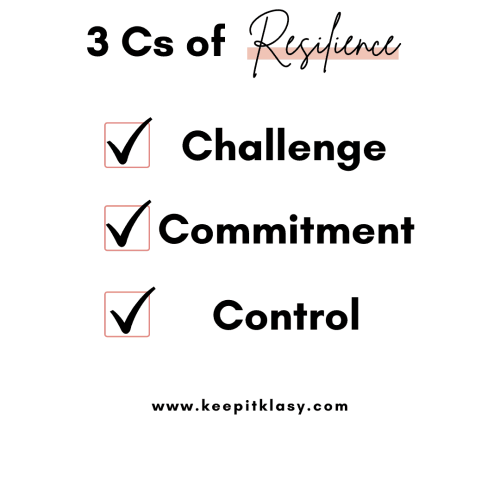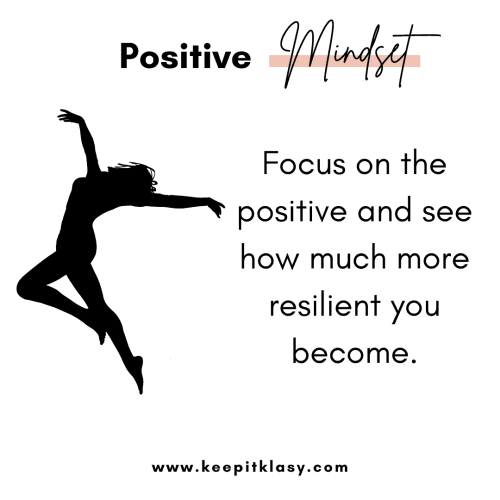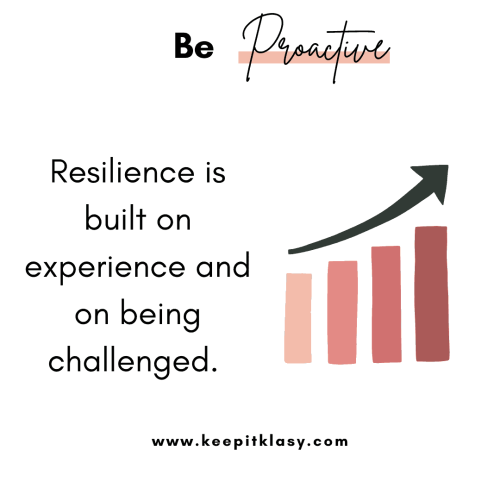
As you go through life you will experience many setbacks and many and it will likely happen in all areas of your life. In those moments it is easy to crumble under the pressure. In some instances, people may never fully recover, and these setbacks will define their life for as long as they live. This is where resilience comes in. When you make the effort to build the resilience you will have the ability to take whatever life throws at you and not let the challenges keep you small. Instead, you will level up and fight to rise above them. This is the power of resilience!
Mental and emotional resilience are not things you are born with. They are skills that you can absolutely learn if you are willing to try.
As women we are faced with a huge number of challenges as we fight for our rights, build careers or businesses, and redefine social norms. It is not easy and in order to withstand the resistance, it is essential that we build resilience.
So, let’s dive in and see just how we can practically build resilience and become the best versions of ourselves.
Disclaimer: This site contains affiliate links to products. We may receive a commission for purchases made through these links. Visit my disclaimer page for more information.
Resilience meaning.
Resilience is:
“The process and outcome of successfully adapting to difficult or challenging life experiences, especially through mental, emotional, and behavioral flexibility and adjustment to external and internal demands.”
3 Elements Essential to Being Resilient.
A leading psychologist, Susan Kobasa, has defined three elements that one needs in order to build resilience or to be seen as having resilience.

#1 Challenge:
Resilient people generally welcome challenges and they see them as an ability to step outside their comfort zone and learn something new. Resilient people are not paralysed by challenges. They can adapt to them and remain action orientated. For resilient people, it is either Fight or flight but never freezes.
#2 Commitment:
Resilient people stay committed to your life and goals. They don’t give up until they succeeded, and they remain consistent.
#3 Control:
Those who are resilient tend to focus and change things they can control. They are never a victim of circumstance but are instead constantly looking at what can be changed. They do not accept defeat.

17 Way to Build Resilience.
1. Learn to relax
Staying in control of the situation is one of the most fundamental ways of becoming more resilient. Too often there is little that we can do about the outside world, and we have limited control over how other people act or treat us. However, we can fully control how we respond to different situations, particularly challenging ones.
When we feel triggered by something that has happened to us or how someone has treated us it is easy to let into those emotions. The ability to take control of our emotions in those critical moments can truly change the impact these moments will have.
Our ability to stay in control has a lot to do with our ability to relax and defuse that trigger before it blows up.
Things like daily meditation and journaling can help to calm the mind and rewire the brain. Over time this practice will help you to stay present and have self-control without giving in to your stress response and acting on heightened emotional states.
2. Practice positive thinking
Switch from a glass half empty to a glass half full kind of person.
Learning to look at the positive side of things takes time and practice. Your mind might be used to always assuming the worst about a situation because that is what it is used to. Focusing on the negative is now its default state. Changing this state of mind and re-wiring the brain to focus on the positive takes conscious practice. So, from now on when you are faced with a challenge and those negative thoughts start flooding in, stop them dead in their tracks. Consciously make a list in your head of what good can come of this situation or at least what you can learn from it.
Shift your mindset to focus on the positives and see how much more resilient you become to anything life throws at you. You will have the ability to quickly bounce back from any disappointment.

3. Learn from mistakes and failure
No one likes to make mistakes, and no one likes to fail. You might have always thought of failure as ‘proof’ that you are not good enough. However, failure is never the opposite of success. Failure and mistakes are what shape your pathway to success. You just have to start seeing failure as a lesson rather than a setback. Every time you fail or make a mistake you have the choice to either give up or get back up and try again. This time you’re approaching things from experience. Having this mindset will help you through any setbacks you experience in life and might even make you less fearful of failure. Imagine how much more courage you will have to take on new opportunities.
4. Practice compassion
Compassion is a very underrated quality to have in today’s world and maybe even considered to be a barrier to building resilience. However, the reason why compassion is such an essential ingredient to becoming resilient is twofold.
First, having compassion can bring about positive feelings. When you can relate to another human being and show them love and empathy you will be flooded with happiness. Doing something nice for someone, being considerate, and treating people with kindness will never go unappreciated and that is rewarding.
Second, compassion means you are able to deeply understand the emotional state of another person. This can be of immense benefit because in situations when someone mistreats you, you can begin to understand that it often has nothing to do with you and a lot more to do with them. This can help you process your feelings faster and move on and set up boundaries where necessary to protect yourself.
5. Learn to respond rather than react
This is something that is often overlooked. Humans are emotional beings, and we are wired to react based on our emotions. However, we also have a consciousness which means we have the self-awareness to examine a situation and take control of how we respond to it.
How often have you left a situation and thought to yourself “I wish I thought of that there and then” or “I wish I had said that and not acted the way I did”. Part of being resilient is knowing when to take a step back from a situation and collect yourself so that you can enter it again but less emotionally. This is a very powerful move because rather than simply reacting to the situation, you will be able to respond with clarity. When addressing difficult situations often you only have one chance to make an impact and have your voice heard. You are less likely to achieve this when you are feeling emotionally aroused and your judgment is clouded. So do not be afraid to take a moment, get control of your emotions and come back into a situation with a clear response.
Learning to have control of your emotions and not letting the outside world affect them is a big part of building resilience.
6. Set goals
Having clear goals will help to boost your self-esteem and confidence and therefore, help to build your resilience. When you have a clear pathway set out for yourself and you are continually working towards your goals you are less likely to be affected by anything that tries to push you off your journey. Hold onto these goals when you are facing difficulties in other areas of your life. Having these goals will help to keep your head above water.

7. Be proactive
You cannot build resilience if you are just letting life happen to you. Being passive about life and only doing the things you need to do or things that are within your comfort zone will not challenge you. Resilience is built on experience and on being challenged. Because how else can you know what you are truly capable of and just how far your abilities go! So next time you have the opportunity to do something that scares you, do it! Be proactive and grab every opportunity you can because you might surprise yourself as to how far your capabilities reach.
Soon you will start to build confidence and begin to see that you are capable of much more than you thought, and your resilience will skyrocket.

8. Face your fears
Do not let your fears keep you small. When you are faced with your fears challenge them. Write down the evidence for and against them. Often things only seem overwhelming and scary because we spend too much time dwelling on all the wrong things. When you take the step to write down evidence against these fears you can look at things a bit more objectively. You may surprise yourself as to how little there is to fear.
9. Try again
Do not give up ever. Stay consistent always.
When life pushes you to the ground, get back up and keep doing so until you make it. If one of your goals means a lot to you, do not take no for an answer. Take it as a ‘not yet’ and try again and again for as long as it takes. Each time you will have improved. The ability to stay consistent and not give up at the sight of the smallest setback is what truly separates successful people from those that never reach their goals. Consistency is a big part of resilience.
10. Practice forgiveness
Holding onto grudges can over time eat away at you, as to keep all these negative emotions bottled up. Sometimes you will not get the apology you deserve and that can make it difficult to move past and let go of any anger. Holding onto this anger can hinder your growth because your mind will continually come back to the events and the people who hurt you. This can start to occupy a big part of your consciousness and rather than focusing your energy on the things that matter you can end up losing energy to process these emotions. If you learn to forgive and let go, even when you do not get a formal apology, you will be in control of setting yourself free.
11. Be flexible
Things will not always go as planned and when they don’t it is very easy to let the disappointment overwhelm you and therefore give up altogether. Developing a mindset where you can remain flexible and adapt to changes is the essence of becoming resilient. When you can remain flexible you have the ability to shift your focus to what you CAN change and control when things do not go as planned. You become action orientated. This approach will help you overcome anything that life throws your way.
12. Have a strong support system
The people you have in your life will form a big part of your backbone, therefore make sure you choose wisely who you let into your life.
Cultivate the relationships you have with the people you trust and those who have been there for you and supported you along the way. When you are in difficult and challenging circumstances, they will be there for you every step of the way.
Trust your gut when it comes to people because not everyone who enters your life will have your best intentions at heart. You will know who those people are so do not be afraid to set the appropriate boundaries where necessary.

13. Become a well-rounded person
Do not focus all your energy on just one area of your life and on only one passion.
When you put all your energy and focus into only one thing and if it does not work out, you will feel like you have completely lost the ground under your feet. If on the other hand, you have other passions and purposes and relationships, the hit will be less painful. You will pick yourself back up quicker.
14. Be assertive
Assertiveness is the ability to be confident and self-assured without being arrogant. It is a fine balance. This takes practice and a bit of trial and error. The most important first step is knowing when to be assertive and, in a nutshell, you should be assertive whenever you feel you need your voice heard. It is never wrong to express your feelings; the key is in how you do it. You want to remain non-confrontational and effectively express your feelings, desires, and needs while valuing and respecting the other person.
15. Get enough sleep
How much more irritable and agitated do you feel after a bad night’s sleep? It is difficult to be resilient and at your best when your baseline is already set to be easily triggered. The smallest of things is more likely to set you off and you will have less power to return to baseline. So getting a good night’s sleep regularly is vital.
16. Take breaks
No one can keep going at 100% all the time. You absolutely need time to reset and unwind. So schedule in regular breaks in your day, in your week, and in your year where you can completely switch off. Never feel guilty for doing this because in the long term it is an essential investment. You will come back to your work or everyday life with a fresher mindset ready to take on more challenges and grind.
17. Get to know yourself
The better you know yourself the more resilient you will become. When you find out your strengths and learn to own them, you will become more confident. You will also have the insight you need to cultivate these strengths when needed.
Equally, knowing your weakness is also vital. It gives you the ability to work on them and understand when they may limit you. This way you can take steps to minimise this and find ways to stop them from limiting you.
Knowing your trigger points is also vital. We all have them because we all have insecurities about one thing or another If you know your trigger points well, you can take full control and diffuse any triggers before they have a chance to make an impact on you. When you know your trigger and someone does something or something happens to set them off, you will not have that initial shock factor. You will be less emotional and more collected in how you respond, or it will just flow over you altogether.

On a Final Note.
To summarise these are the steps you can take to build resilience:
- Learn to relax
- Practice positive thinking
- Learn from mistakes and failure
- Practice compassion
- Learn to respond rather than react
- Set goals
- Be proactive
- Face your fears
- Try again
- Practice forgiveness
- Be flexible
- Have a strong support system
- Become a well-rounded person
- Be assertive
- Get enough sleep
- Take breaks
- Get to know yourself
Comment below and let us know how you plan to build resilience in your life.
Natasza
xxx


